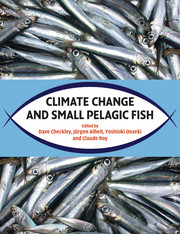Book contents
- Frontmatter
- Contents
- Acknowledgments
- List of abbreviations
- List of contributors
- Foreword by Jorge Csirke, Michael Glantz, and James Hurrell
- Preface
- 1 History of international co-operation in research
- 2 A short scientific history of the fisheries
- 3 Habitats
- 4 Variability from scales in marine sediments and other historical records
- 5 Decadal-scale variability in populations
- 6 Biophysical models
- 7 Trophic dynamics
- 8 Impacts of fishing and climate change explored using trophic models
- 9 Current trends in the assessment and management of stocks
- 10 Global production and economics
- 11 Human dimensions of the fisheries under global change
- 12 Mechanisms of low-frequency fluctuations in sardine and anchovy populations
- 13 Research challenges in the twenty-first century
- 14 Conjectures on future climate effects on marine ecosystems dominated by small pelagic fish
- 15 Synthesis and perspective
- Index
11 - Human dimensions of the fisheries under global change
Published online by Cambridge University Press: 08 January 2010
- Frontmatter
- Contents
- Acknowledgments
- List of abbreviations
- List of contributors
- Foreword by Jorge Csirke, Michael Glantz, and James Hurrell
- Preface
- 1 History of international co-operation in research
- 2 A short scientific history of the fisheries
- 3 Habitats
- 4 Variability from scales in marine sediments and other historical records
- 5 Decadal-scale variability in populations
- 6 Biophysical models
- 7 Trophic dynamics
- 8 Impacts of fishing and climate change explored using trophic models
- 9 Current trends in the assessment and management of stocks
- 10 Global production and economics
- 11 Human dimensions of the fisheries under global change
- 12 Mechanisms of low-frequency fluctuations in sardine and anchovy populations
- 13 Research challenges in the twenty-first century
- 14 Conjectures on future climate effects on marine ecosystems dominated by small pelagic fish
- 15 Synthesis and perspective
- Index
Summary
Summary
The human dimensions of fisheries for small pelagic fishes represent an interface of natural and social sciences, mainly concerning management and governance issues, but not limited to these. This chapter provides a brief overview of the scope of interactions between these domains, as a guide to future studies. We highlight important social, economic, institutional, and cultural issues arising from other chapters in this volume, such as power, resource access, equity, property rights, scales, globalized markets, ethics, interactive political agendas between developed and developing countries and technology, and refer to results of existing studies focusing on SPACC (Small Pelagic Fish and Climate Change) regions. We outline how scientists from these disciplines can work together, and with stakeholders such as resource users and managers, towards improved stewardship of the local and global marine ecosystems that are faced with significant global changes (including climate change), of which small pelagic fisheries and humans are an important interactive part.
Introduction: coasts under stress!
This chapter is a preliminary exploration of the human dimensions of small pelagic fisheries under global change. It examines the interface between the natural and social sciences and humanities, mainly (but not entirely) concerning management, use and governance issues in small pelagic fisheries. This is particularly important at a time when national and local fisheries are being forced to cope with globalization, major global climatic environmental stresses, and the interactions between these two external driving forces. Under such conditions, answers to governance issues will not be clarified by looking at fisheries (individually or globally) from a purely bio-economic perspective.
- Type
- Chapter
- Information
- Climate Change and Small Pelagic Fish , pp. 275 - 284Publisher: Cambridge University PressPrint publication year: 2009
- 2
- Cited by



